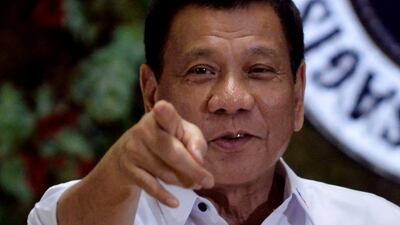While Indian expatriates who want to vote in their upcoming elections will have to fly home to cast a ballot, Filipinos in the UAE will be able to have their say from their adopted homeland.
The Philippines is one of several countries to have an absentee voting system, which allows nationals aged 18 and above to take part from overseas, as long as they are registered in advance.
There are 109,130 voters eligible to take part in Abu Dhabi, according to the Filipino embassy. The figure represents a 51 per cent increase on the 2016 figure. A further 209,862, living in Dubai and the northern Emirates, are also able to vote, according to the consulate there.
In the Philippines, voters in the mid-terms will be choosing more than 17,000 local government representatives, all the way up to powerful senators, with 12 of the 24 seats in the country’s upper house of Congress being contested. All seats in the House of Representatives, the lower house of Congress, are up for grabs.
For voters based in the UAE and elsewhere, they only vote on senators, who represent the whole nation rather than specific areas, and a minority of members of the House of Representatives who are elected through ‘party lists’.
The party list system, where voters choose a party rather than an individual under a system of proportional representation, is used for 20 per cent of the 297 House of Representatives seats. The rest of the seats are contested through a ‘first past the post’ electoral system, meaning the candidate with the highest number of votes wins, and represent specific geographic areas, meaning they are not voted upon by overseas Filipinos.
Arguably the country’s most famous politician, the boxing idol and senator Manny Pacquiao, is not up for re-election, as he is half way through a six-year term. However, he has a prominent role, running the campaign for the ruling PDP-Laban Party. The Presidency, currently held by the controversial Rodrigo Duterte, is also not being decided upon although the vote, and particularly the Senate race, is being seen by many as a referendum on his leadership and could prove crucial for the remainder of his time in office.
Elected convincingly in 2016, Duterte has pursued a bloody and violent war on drugs, backed a return to capital punishment and has launched an anti-corruption drive. However, a favourable Senate and House of Representatives, which both have the power to block laws, is seen as vital if he is to deliver on his priorities, including a programme of constitutional reform and a huge injection of infrastructure spending. Among Duterte's recent proposals is lowering the age of criminal responsibility to nine.
Across the world, there are around 1.8 million overseas voters registered to vote in the national elections. Only Saudi Arabia, with 326,551, has more registered voters than the UAE’s 319,000. The overseas voting system has been in place since 2004.
Voting begins on Saturday, and lasts until the official election day on May 13. Registered voters can cast ballots at the Abu Dhabi embassy and Dubai consulate, with mobile voting stations also set to be deployed to areas with high concentrations of Filipino nationals. Testing and sealing of vote counting machines in Abu Dhabi and Dubai has been completed.
Overseas turnout for mid-term elections has traditionally been low, although higher numbers are anticipated due to the strength feeling among both supporters and opponents of Duterte.

